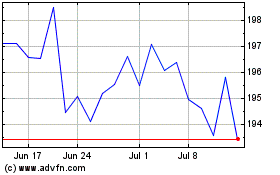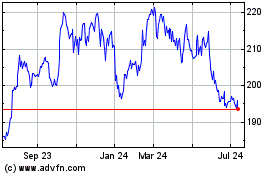US Rep Barney Frank Calls For CME To Spin Off Regulation
December 15 2011 - 6:36PM
Dow Jones News
The top Democrat on the House Financial Services Committee on
Thursday said that CME Group Inc. (CME), the biggest U.S. futures
exchange, should no longer be responsible for supervising its own
customers to eliminate any potential conflicts of interest.
Spinning off CME's regulatory functions into a separate entity
would help restore investors' lost confidence in domestic futures
markets, said Rep. Barney Frank (D., Mass.) in an interview.
"I have no doubt about the CME's integrity, but nobody should be
in the position of having a dual role," Frank said. "We should make
sure [a conflict of interest] doesn't arise, that the temptation
isn't there, that people are not unconsciously influenced."
CME owns the Chicago Mercantile Exchange, the Chicago Board of
Trade and the New York Mercantile Exchange, presiding over more
than 90% of U.S. trade in futures on the price of grains, crude oil
and key interest rates.
The firm also serves as the main regulator at the exchange level
for nearly 100 futures clearing firms in the U.S., which process
the trading of customers like asset managers, grain elevators and
power companies. Its role involves auditing such firms, checking
customer fund balances and verifying that the money is invested in
permitted securities.
CME employs about 150 people in its market regulation division,
plus about 60 more who perform regulatory audits for CME's
clearinghouse division.
A spokesman for CME said in a statement that the company
believes that its current model "still makes sense and that the CME
Group is in the best position to be the first-line of regulation
for these firms."
Frank pointed to the separation of the Nasdaq Stock Market, now
owned by Nasdaq OMX Group Inc. (NDAQ), from the National
Association of Securities Dealers. That process began in 2000 and
saw the NASD become a full-time regulatory body now known as the
Financial Industry Regulatory Authority, or Finra. Part of the
rationale of that move was to separate the regulatory function from
a for-profit exchange operation.
"I think it would be better if they did what NASD did," Frank
said Thursday.
The U.S. futures industry has rallied to defend its
self-regulatory model in the wake of the MF Global (MFGLQ)
bankruptcy, which revealed a shortfall in customer funds that has
yet to be fully accounted for and could range higher than $1.2
billion, according to a court-appointed trustee unwinding the
firm's brokerage.
CME and the Commodity Futures Trading Commission have drawn
criticism for their oversight of MF Global, and lawmakers have
suggested more frequent audits and other measures may be needed to
tighten up practices in the industry. Terry Duffy, executive
chairman of the CME, has said that no amount of regulations can
stop someone who is set on breaking the law.
"MF Global violated the government regulations designed to
protect customer funds," the CME spokesman said Thursday. "That
said, CME is eager to explore all proposals for improvements that
would increase the security of customer funds at the firm level and
restore confidence in the futures industry, and we plan to be very
active participants in that process."
-By Jacob Bunge, Dow Jones Newswires; 312-750-4117;
jacob.bunge@dowjones.com
CME (NASDAQ:CME)
Historical Stock Chart
From May 2024 to Jun 2024

CME (NASDAQ:CME)
Historical Stock Chart
From Jun 2023 to Jun 2024
